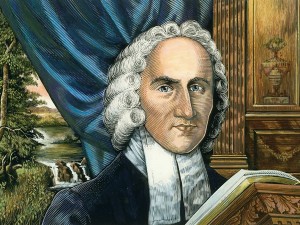 John Piper:
John Piper:
Edwards answers, “If by ‘the author of sin,’ be meant the sinner, the agent, or the actor of sin, or the doer of a wicked thing . . . it would be a reproach and blasphemy, to suppose God to be the author of sin. In this sense, I utterly deny God to be the author of sin.”
But, he argues, willing that sin exist in the world is not the same as sinning. God does not commit sin in willing that there be sin. God has established a world in which sin will indeed necessarily come to pass by God’s permission, but not by his “positive agency.”
God is, Edwards says, “the permitter . . . of sin; and at the same time, a disposer of the state of events, in such a manner, for wise, holy and most excellent ends and purposes, that sin, if it be permitted . . . will most certainly and infallibly follow.”
He uses the analogy of the way the sun brings about light and warmth by its essential nature, but brings about dark and cold by dropping below the horizon. “If the sun were the proper cause of cold and darkness,” he says, “it would be the fountain of these things, as it is the fountain of light and heat: and then something might be argued from the nature of cold and darkness, to a likeness of nature in the sun.” In other words, “sin is not the fruit of any positive agency or influence of the most High, but on the contrary, arises from the withholding of his action and energy, and under certain circumstances, necessarily follows on the want of his influence.”
Thus in one sense God wills that what he hates come to pass, as well as what he loves. Edwards says,
God may hate a thing as it is in itself, and considered simply as evil, and yet . . . it may be his will it should come to pass, considering all consequences. . . . God doesn’t will sin as sin or for the sake of anything evil; though it be his pleasure so to order things, that he permitting, sin will come to pass; for the sake of the great good that by his disposal shall be the consequence. His willing to order things so that evil should come to pass, for the sake of the contrary good, is no argument that he doesn’t hate evil, as evil: and if so, then it is no reason why he may not reasonably forbid evil as evil, and punish it as such.
This is a fundamental truth that helps explain some perplexing things in the Bible, namely, that God often expresses his will to be one way, and then acts to bring about another state of affairs.
God opposes hatred toward his people, yet ordained that his people be hated in Egypt (Genesis 12:3; Psalm 105:25—”He turned their hearts to hate his people”).
He hardens Pharaoh’s heart, but commands him to let his people go (Exodus 4:21; 5:1; 8:1).
He makes plain that it is sin for David to take a military census of his people, but he ordains that he do it (2 Samuel 24:1; 24:10).
He opposes adultery, but ordains that Absalom should lie with his father’s wives (Exodus 20:14; 2 Samuel 12:11).
He forbids rebellion and insubordination against the king, but ordained that Jeroboam and the ten tribes should rebel against Rehoboam (Romans 13:1; 1 Samuel 15:23; 1 Kings 12:15-16).
He opposes murder, but ordains the murder of his Son (Exodus 20:13; Acts 4:28).
He desires all men to be saved, but effectually calls only some (1 Timothy 2:4; 1 Corinthians 1:26-30; 2 Timothy 2:26).
What this means is that we must learn that God wills things in two different senses. The Bible demands this by the way it speaks of God’s will in different ways. Edwards uses the terms “will of decree” and “will of command.” Edwards explains:
[God’s] will of decree [or sovereign will] is not his will in the same sense as his will of command [or moral will] is. Therefore it is not difficult at all to suppose that the one may be otherwise than the other: his will in both senses is his inclination. But when we say he wills virtue, or loves virtue or the happiness of his creature; thereby is intended that virtue or the creature’s happiness, absolutely and simply considered, is agreeable to the inclination of his nature. His will of decree is his inclination to a thing not as to that thing absolutely and simply, but with reference to the universality of things. So God, though he hates a things as it is simply, may incline to it with reference to the universality of things.
HT: JT

 The question of evil is a big one and far bigger than most Christians realise. Dr. R. C. Sproul has outlined the issue very well.
The question of evil is a big one and far bigger than most Christians realise. Dr. R. C. Sproul has outlined the issue very well. One of the most important approaches to the problem of evil is that set forth originally by Augustine and then later by Aquinas, in which they argued that evil has no independent being. Evil cannot be defined as a thing or as a substance or as some kind of being. Rather, evil is always defined as an action, an action that fails to meet a standard of goodness. In this regard, evil has been defined in terms of its being either a negation (negatio) of the good, or a privation (privatio) of the good. In both cases, the very definition of evil depends upon a prior understanding of the good. In this regard, as Augustine argued, evil is parasitic — that is, it depends upon the good for its very definition. We think of sin as something that is unrighteous, involving disobedience, immorality, and the like. All of these definitions depend upon the positive substance of the good for their very definition. Augustine argues that though Christians face the difficulty of explaining the presence of evil in the universe, the pagan has a problem that is twice as difficult. Before one can even have a problem of evil, one must first have an antecedent existence of the good. Those who complain about the problem of evil now also have the problem of defining the existence of the good. Without God there is no ultimate standard for the good.
One of the most important approaches to the problem of evil is that set forth originally by Augustine and then later by Aquinas, in which they argued that evil has no independent being. Evil cannot be defined as a thing or as a substance or as some kind of being. Rather, evil is always defined as an action, an action that fails to meet a standard of goodness. In this regard, evil has been defined in terms of its being either a negation (negatio) of the good, or a privation (privatio) of the good. In both cases, the very definition of evil depends upon a prior understanding of the good. In this regard, as Augustine argued, evil is parasitic — that is, it depends upon the good for its very definition. We think of sin as something that is unrighteous, involving disobedience, immorality, and the like. All of these definitions depend upon the positive substance of the good for their very definition. Augustine argues that though Christians face the difficulty of explaining the presence of evil in the universe, the pagan has a problem that is twice as difficult. Before one can even have a problem of evil, one must first have an antecedent existence of the good. Those who complain about the problem of evil now also have the problem of defining the existence of the good. Without God there is no ultimate standard for the good.